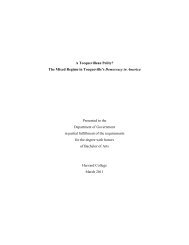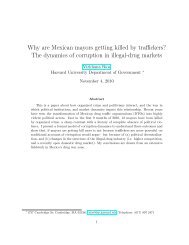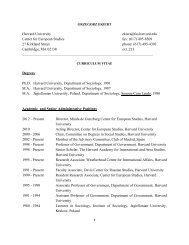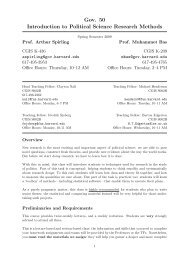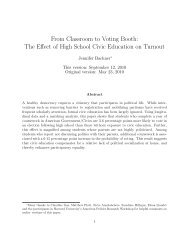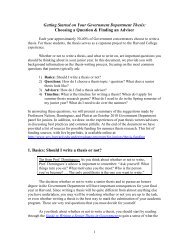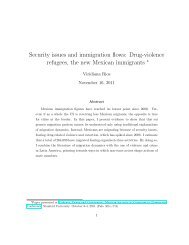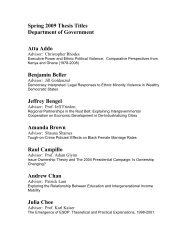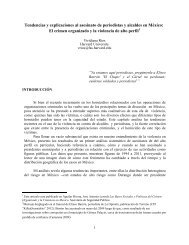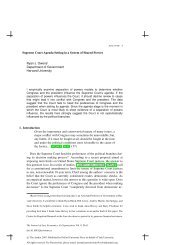1 Harvard University Political Theory Colloquium For 11 March 2010 ...
1 Harvard University Political Theory Colloquium For 11 March 2010 ...
1 Harvard University Political Theory Colloquium For 11 March 2010 ...
Create successful ePaper yourself
Turn your PDF publications into a flip-book with our unique Google optimized e-Paper software.
3 <br />
(Pettit 2004: 68). Plato’s approach differs, on the one hand, in focusing on the case<br />
where an agent’s condition would seem to be characterized not by any intentional states<br />
but specifically by knowledge; but, on the other hand, in implying that knowledge which<br />
is not executively effective in preventing akrasia is not truly knowledge at all.<br />
II. The conventional reading of akrasia as weakness of will and its lack of fit with<br />
Plato<br />
The designation of ‘weakness of will’ as an equivalent to akrasia has a long pedigree<br />
which is captured well in Donald Davidson’s classic analysis, consideration of which<br />
reveals its maladaptedness as an interpretation of Plato. Davidson contrasts two images,<br />
the first lacking any notion of the will, the second appealing to it. The first depicts<br />
incontinence (akrasia) as ‘a battle or struggle between two contestants’:<br />
Each contestant is armed with his argument or principle. One side may be labeled<br />
‘passion’ and the other ‘reason’; they fight; one side wins, the wrong side, the side<br />
called ‘passion’ (or ‘lust’ or ‘pleasure’). (Davidson 2001 [1980]): 35)<br />
Although Davidson does not remark it (attributing it rather to Aristotle, Aquinas and<br />
Hare), this is the view attributed by ‘the many’ to ‘most people’ in the Protagoras.<br />
Pleasure, pain, anger, and other emotions and desires are said to be viewed by ‘most<br />
people’ as the sorts of things that can simply overcome reason in a fair fight, with the<br />
contenders on all fours. This is the view against which the purported Socratic<br />
intellectualism of the Protagoras squares off. Reason vs a purportedly autonomous and<br />
equal set of passions and desires: there is no evidence of ‘will’ on either side of this<br />
contest.<br />
It might be thought that the Republic introduces the role of the will in its account<br />
of the divided embodied soul. So thought Davidson in attributing his second image to<br />
Plato (presumably in the Republic), Butler, and Dante. Davidson explains the second<br />
image thus:



